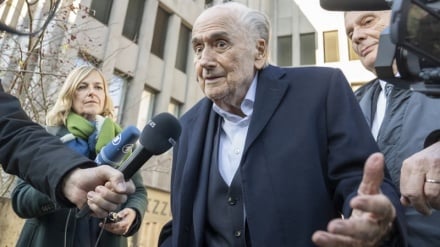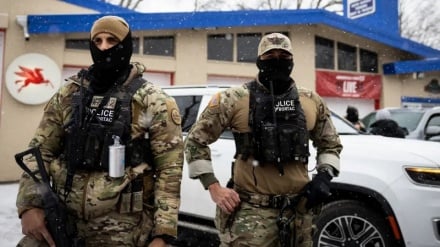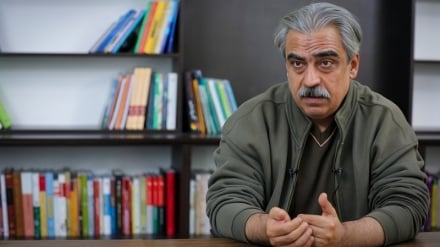US suffers strategic loss in Venezuela
The Washington backed coup that miserably failed in Caracas is yet another proof of the bankrupt regime-change policies of President Donald Trump.
Journalist and former executive director of the Nepal South Asia Centre, Bhim Bhurtel, who is an expert in international relations and teaches at Kathmandu University, has written an article in this regard for Asia Times, titled: “US suffers strategic loss in Venezuela”.
After the recent American foreign-policy farce in Venezuela, a typically Nepal-style mockery of the US has been growing popular in Kathmandu. The witty reproach is all about the recent US attempt to topple Venezuelan President Nicholas Maduro’s regime. The Nepalese foreign-policy elites, foreign-policy and international-affairs journalists, and academia believe that the failed US attempt to overthrow Nikolas Maduro’s government depicts the diminishing size of American global prominence.
People in Kathmandu think the United States of America can only put pressure on small and weak countries like Nepal but not a country like Venezuela, which has the backing of powerful countries such as Russia and China. As well, they believe that the US sphere of influence now has midget stature not only globally but even in the Western Hemisphere.
Nepalis have good reason to mock the US. After the US recognized Juan Guaidó, head of Venezuela’s National Assembly, as the interim president on January 23, a statement was issued by Pushpa Kamal Dahal, chairman of the ruling Nepal Communist Party (NCP), that disparaged the recognition of Guaidó by the US and its allies. Dahal strongly condemned the move as foreign meddling in Venezuela’s internal affairs. He said the US had no right to orchestrate a coup against the democratically elected government of President Maduro.
After the statement was issued by Dahal, Washington summoned the Nepalese ambassador to ask him to clarify the government’s official stance on the Venezuela row. Nepal’s Ministry of Foreign Affairs issued a diplomatically crafted statement that did not contradict Dahal.
After the clarification of the official position of the Nepalese government, the US ambassador to Nepal, Randy Berry, skipped the briefing session of the Nepal Investment Summit, organized by the government, to express America’s displeasure at Nepal’s stance on the Venezuela row. However, Nepal refused to change its stance, and later on, the US sent Joseph Felter, the deputy assistant secretary of defense for South and Southeast Asia, to Nepal to soothe the strained relations between Washington and Kathmandu. Felter is the most senior US official to visit the Himalayan nation since President Donald Trump was elected in 2016.
Perhaps, having experienced the overthrow of despotic regimes three times with the help of popular uprising in less than 70 years of history, nobody knows better than the Nepalis how difficult it is to change a regime. President Trump’s top aides – Secretary of State Mike Pompeo, national security adviser John Bolton and special envoy to Venezuela Elliott Abrams were thinking a regime change in Venezuela had the strong backing of powerful countries and so would be a piece of cake. They believed that a rebellion in the Venezuelan military would incite a popular uprising and topple a leader they had described as “a reviled despot who must be replaced.”
American officials’ claims, however, that their key supporters in Venezuela were about to defect from the Maduro regime were not realized. Bolton had cited three names of top Venezuelan office bearers who supported regime change after Guaidó appealed for a military mutiny. These three people were Vladimir Padrino, the defense minister, Maikel Moreno, the head of the Supreme Court, and Ivan Rafael Hernandez Dala, the head of the presidential guard. According to the plan, the Supreme Court would endorse Guaidó as the legitimate president and declare Maduro’s election illegitimate as cover for the military to defect. Abrams went a step further, saying that a 15-point document had been discussed between Guaidó’s allies and members of Maduro’s inner circle.
On April 30, it appeared that the plot had fallen short, with Padrino appearing alongside Maduro in a high-profile show of support and criticizing those behind the attempted military recalcitrance. At the end of the day, President Maduro remained in power.
Pompeo and Abrams have been blaming Russia and Cuba for sabotaging the plot and frustrating their plans. But the entire project made Trump’s aides look like fools.
The failed attempt to overthrow the Maduro regime raises many questions. First is whether the United States had faulty intelligence about the real ability of Guaidó to attract close Maduro aides to his side. It would not be the first time the US had suffered from intelligence failure. For instance, after the US invaded Iraq in 2003 and weapons of mass destruction were not found, the secretary of state at the time, Colin Powell, publicly admitted that he had been misinformed. The Washington Post reported that Trump was “complaining he was misled about how easy it would be to replace the socialist strongman with a young opposition figure, according to administration officials and White House advisers.”
The second question is about whether White House aides had misread the objective reality on the ground. However powerful a country is economically, technologically, militarily, and strategically, and whatever weapons are at its disposal, it won’t win a war if it has misread events objectively in the field. The US should know this from its bitter defeat in the Vietnam War some 45 years ago.
The third question is whether Trump’s impulsive behavior was responsible for the failed coup. Regime change is only possible if there is an intense desire or willingness to bring about the change.
If there is genuine desire or willingness, regime change demands the ability to bring it to fruition. That ability comes from a rationally informed and objective reading of the situation on the ground in both domestic politics and geopolitics. The United States is not in a position to finance the rebuilding of Venezuela if the Maduro regime is forcefully ousted eventually. The Trump administration wants to see a win in the Western Hemisphere on the foreign-policy front before the US election in 2020; however, it has neither the willingness nor the ability to finance nation-building in Venezuela post-Maduro.
Last, the most crucial question is how the US can reclaim its Monroe Doctrine. Trump says Russia should get out of Venezuela. Bolton says, “The United States will not tolerate hostile foreign meddling with the Western Hemisphere’s shared goals of democracy, security, and the rule of law.” Both the president and his national security adviser mean that the Monroe Doctrine must be restored in Venezuela.
Russian Foreign Minister Sergey Lavrov, on the sidelines of the 11th ministerial meeting of the Arctic Council, told his US counterpart Pompeo that “if the US intervened military in Venezuela, it would be catastrophic.”
Russia, Turkey, China, Iran, Bolivia and Mexico have been supporting Maduro. China and Russia have backed Maduro for two reasons. First is that they stand to lose hugely if the Maduro’s leftist government is overthrown. China has invested an estimated $70 billion in Venezuela since 2008, and Russia too has tens of billions’ worth of investment in the South American country. The second reason is the substantial strategic power game to offset America’s sphere of influence not only in the Western Hemisphere, but also in the East. As Fred Weir opined in the Christian Science Monitor, “Russia wants to counter that the US needs to end its two-decade-old binge of regime-change operations, which includes supporting anti-Moscow revolutions in Russia’s own backyard.”
The US will have to sit at the table with Russia and China or through the United Nations Security Council to resolve the issue of Venezuela. Its missteps in its Venezuelan regime-change agenda are leading to a grave diminishment of its global influence. The US may be able to pressure weak countries like Nepal on the Venezuela row, but not Venezuela itself.
AS/SS


